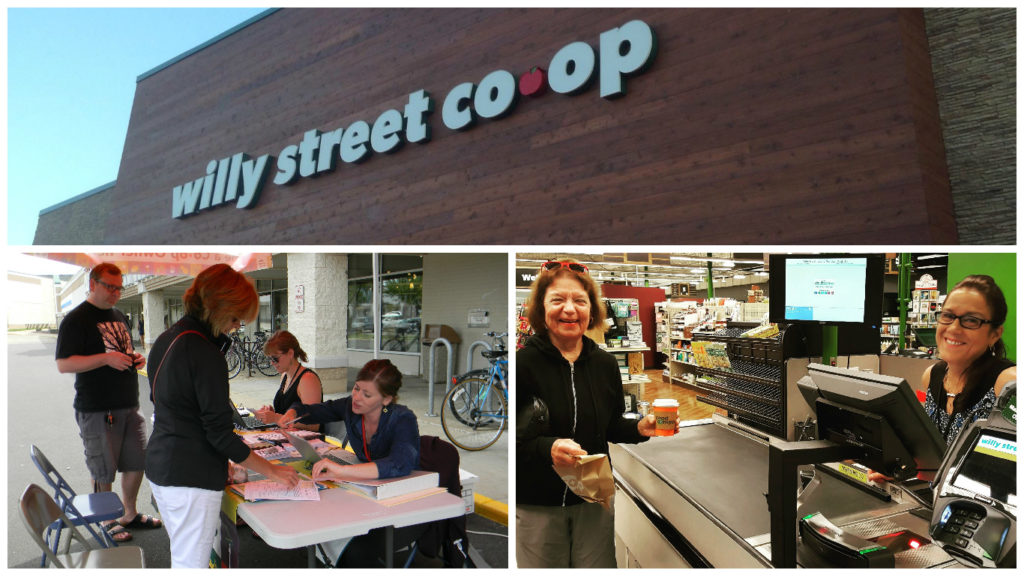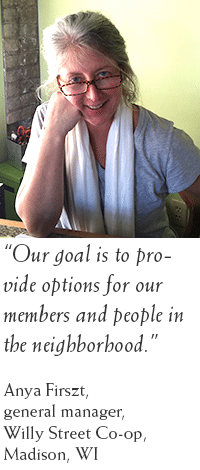
Willy Street Co-op
Madison, Wisc.
Year founded: 1974
Equity investment: $56 single/$91 household + $2 service fee
Number of members: 34,000
Number of employees: 420
Number of locations: 3 retails, commissary kitchen, central office
Every day food co-ops must make decisions within the context of one of the most intractable dilemmas of the grocery industry. How does the co-op reconcile customer desire for lower grocery bills and adhere to the values of equity, economic fairness and sustainability when cheap food is usually synonymous with exploitation throughout the food chain? The answer, like the question, is complex. Successfully navigating a whole community’s needs for food that is fairly-produced, healthy, environmentally sustainable and budget-friendly requires thoughtfulness and balance in addition to a whole lot of listening.
As co-ops face the need to make changes if they want to appeal to a wider customer base, communities are grappling with these questions, as well as a belief and hope that some of these issues can be overcome through working together. The Willy Street Co-op began working with the Northside Planning Council in Madison, Wisc. when an independent neighborhood grocer was going out of business. The community did not want to be without a grocery store, and had approached Willy Street over a year ago for advice about starting a food co-op. Those discussions quickly morphed into how the existing co-op could launch its third store in the defunct grocer’s location.
 Willy Street wanted to help, but also had their own concerns. The market study revealed pockets of both poverty and wealth in the community. “We understood the challenges,” said Anya Firszt, the co-op’s general manager. “This was a neighborhood not typically suited for a natural food co-op. Conventional products were a big part of the former supermarket’s product line. We knew we weren’t going to convert everyone to organic, neither philosophically or on price.”
Willy Street wanted to help, but also had their own concerns. The market study revealed pockets of both poverty and wealth in the community. “We understood the challenges,” said Anya Firszt, the co-op’s general manager. “This was a neighborhood not typically suited for a natural food co-op. Conventional products were a big part of the former supermarket’s product line. We knew we weren’t going to convert everyone to organic, neither philosophically or on price.”
Yet the co-op and its partners were very committed to the idea that community ownership could be a win-win for everyone. “The neighborhood association felt it was valuable for the community to ‘be a part of something,’ to bring co-op ownership to residents and to allow them the choice to participate,” Firszt said.
The co-op moved forward with its plans to remodel and refurbish the space and engage in community outreach. They asked for input from the neighborhood association and residents by holding community meetings. They sought out (and are still receiving) receipts from people regarding products they like to buy. “It was by far the best and most challenging outreach we’ve done with our owners and the community,” Firszt said.
They also learned some hard truths about what people perceived as barriers to shopping at the co-op, and as a result Willy Street dropped their non-owner surcharge of 5%, amped up promotion of their Access Discount, and made ownership more accessible by applying fair share profits to the cost and installing easy payment plans. The co-op also sought WIC certification, a program that provides food basics to children and lactating mothers in need, which meant that in order to participate, the co-op had to sell products that didn’t fit their “normal” shelf set for a natural food store.
The co-op also had critics opposed to these changes in product offerings, those who believed that offering conventional food was not in keeping with the co-op’s values. Firszt understands their concerns. “It’s an experiment and a good challenge,” she said, “To figure out the right products will take time. We also have to acknowledge there are equal issues with people feeling economic challenges. Some people can’t afford $4 a dozen free range eggs.”
As they do the work to meet an economically and racially diverse community’s needs, overall Firszt feels a sense of purpose and optimism. “We’ve had more overwhelming support for it, especially for putting a store in the neighborhood that is responsive to its need. Our goal is to provide options for our members and people in the neighborhood.”
Have more questions?
Get in touch with one of our consultants.
